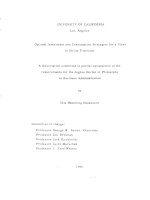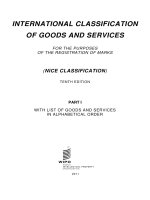UNITED NATIONS CONVENTION ON CONTRACTS FOR THE INTERNATIONAL SALE OF GOODS (1980)
Bạn đang xem bản rút gọn của tài liệu. Xem và tải ngay bản đầy đủ của tài liệu tại đây (164.75 KB, 30 trang )
UNITED NATIONS CONVENTION ON CONTRACTS FOR THE
INTERNATIONAL SALE OF GOODS (1980)
CONTENTS
I. UNITED NATIONS CONVENTION ON CONTRACTS FOR THE
INTERNATIONAL SALE OF GOODS
PREAMBLE
Part I. Sphere of application and general provisions
CHAPTER I. SPHERE OF APPLICATION
Article 1
Article 2
Article 3
Article 4
Article 5
Article 6
CHAPTER II. GENERAL PROVISIONS
Article 7
Article 8
Article 9
Article 10
Article 11
Article 12
Article 13
Part II. Formation of the contract
Article 14
Article 15
Article 16
Article 17
Article 18
Article 19
Article 20
Article 21
Article 22
Article 23
Article 24
Part III. Sale of goods
CHAPTER I. GENERAL PROVISIONS
Article 25
Article 26
Article 27
Article 28
Article 29
CHAPTER II. OBLIGATIONS OF THE SELLER
Article 30
Section I. Delivery of the goods and handing over of documents
Article 31
Article 32
Article 33
Article 34
Section II. Conformity of the goods and third party claims
Article 35
Article 36
Article 37
Article 38
Article 39
Article 40
Article 41
Article 42
Article 43
Article 44
Section III. Remedies for breach of contract by the seller
Article 45
Article 46
Article 47
Article 48
Article 49
Article 50
Article 51
Article 52
CHAPTER III. OBLIGATIONS OF THE BUYER
Article 53
Section I. Payment of the price
Article 54
Article 55
Article 56
Article 57
Article 58
Article 59
Section II. Taking delivery
Article 60
Section III. Remedies for breach of contract by the buyer
Article 61
Article 62
Article 63
Article 64
Article 65
CHAPTER IV. PASSING OF RISK
Article 66
Article 67
Article 68
Article 69
Article 70
CHAPTER V. PROVISIONS COMMON TO THE OBLIGATIONS OF
THE SELLER AND OF THE BUYER
Section I. Anticipatory breach and instalment contracts
Article 71
Article 72
Article 73
Section II. Damages
Article 74
Article 75
Article 76
Article 77
Section III. Interest
Article 78
Section IV. Exemptions
Article 79
Article 80
Section V. Effects of avoidance
Article 81
Article 82
Article 83
Article 84
Section VI. Preservation of the goods
Article 85
Article 86
Article 87
Article 88
Part VI. Final provisions
Article 89
Article 90
Article 91
Article 92
Article 93
Article 94
Article 95
Article 96
Article 97
Article 98
Article 99
Article 100
Article 101
II. EXPLANATORY NOTE BY THE UNCITRAL SECRETARIAT ON THE
UNITED NATIONS CONVENTION ON CONTRACTS FOR THE
INTERNATIONAL SALE OF GOODS
INTRODUCTION
Part One. Scope of application and general provisions
A. Scope of application
B. Party autonomy
C. Interpretation of the Convention
D. Interpretation of the contract; usages
E. Form of the contract
Part Two. Formation of the contract
Part Three. Sale of goods
A. Obligations of the seller
B. Obligations of the buyer
C. Remedies for breach of contract
D. Passing of risk
E. Suspension of performance and anticipatory breach
F. Exemption from liability to pay damages
G. Preservation of the goods
Part Four. Final clauses
I. United Nations Convention on Contracts for the International Sale of Goods
PREAMBLE
The States Parties to this Convention,
Bearing in mind the broad objectives in the resolutions adopted by the sixth special session
of the General Assembly of the United Nations on the establishment of a New International
Economic Order,
Considering that the development of international trade on the basis of equality and mutual
benefit is an important element in promoting friendly relations among States,
Being of the opinion that the adoption of uniform rules which govern contracts for the
international sale of goods and take into account the different social, economic and legal
systems would contribute to the removal of legal barriers in international trade and promote
the development of international trade,
Have agreed as follows:
Part I. Sphere of application and general provisions
CHAPTER 1. SPHERE OF APPLICATION
Article 1
(1) This Convention applies to contracts of sale of goods between parties whose places of
business are in different States:
(a) when the States are Contracting States; or
(b) when the rules of private international law lead to the application of the law of a
Contracting State.
(2) The fact that the parties have their places of business in different States is to be
disregarded whenever this fact does not appear either from the contract or from any dealings
between, or from information disclosed by, the parties at any time before or at the conclusion
of the contract.
(3) Neither the nationality of the parties nor the civil or commercial character of the parties
or of the contract is to be taken into consideration in determining the application of this
Convention.
Article 2
This Convention does not apply to sales:
(a) of goods bought for personal, family or household use, unless the seller, at any
time before or at the conclusion of the contract, neither knew nor ought to have
known that the goods were bought for any such use;
(b) by auction;
(c) on execution or otherwise by authority of law;
(d) of stocks, shares, investment securities, negotiable instruments or money;
(e) of ships, vessels, hovercraft or aircraft;
(f) of electricity.
Article 3
(1) Contracts for the supply of goods to be manufactured or produced are to be considered
sales unless the party who orders the goods undertakes to supply a substantial part of the
materials necessary for such manufacture or production.
(2) This Convention does not apply to contracts in which the preponderant part of the
obligations of the party who furnishes the goods consists in the supply of labour or other
services.
Article 4
This Convention governs only the formation of the contract of sale and the rights and
obligations of the seller and the buyer arising from such a contract. In particular, except as
otherwise expressly provided in this Convention, it is not concerned with:
(a) the validity of the contract or of any of its provisions or of any usage;
(b) the effect which the contract may have on the property in the goods sold.
Article 5
This Convention does not apply to the liability of the seller for death or personal injury
caused by the goods to any person.
Article 6
The parties may exclude the application of this Convention or, subject to article 12, derogate
from or vary the effect of any of its provisions.
CHAPTER II. GENERAL PROVISIONS
Article 7
(1) In the interpretation of this Convention, regard is to be had to its international character
and to the need to promote uniformity in its application and the observance of good faith in
international trade.
(2) Questions concerning matters governed by this Convention which are not expressly
settled in it are to be settled in conformity with the general principles on which it is based or,
in the absence of such principles, in conformity with the law applicable by virtue of the rules
of private international law.
Article 8
(1) For the purposes of this Convention statements made by and other conduct of a party are
to be interpreted according to his intent where the other party knew or could not have been
unaware what that intent was.
(2) If the preceding paragraph is not applicable, statements made by and other conduct of a
party are to be interpreted according to the understanding that a reasonable person of the
same kind as the other party would have had in the same circumstances.
(3) In determining the intent of a party or the understanding a reasonable person would have
had, due consideration is to be given to all relevant circumstances of the case including the
negotiations, any practices which the parties have established between themselves, usages
and any subsequent conduct of the parties.
Article 9
(1) The parties are bound by any usage to which they have agreed and by any practices
which they have established between themselves.
(2) The parties are considered, unless otherwise agreed, to have impliedly made applicable to
their contract or its formation a usage of which the parties knew or ought to have known and
which in international trade is widely known to, and regularly observed by, parties to
contracts of the type involved in the particular trade concerned.
Article 10
For the purposes of this Convention:
(a) if a party has more than one place of business, the place of business is that which
has the closest relationship to the contract and its performance, having regard to the
circumstances known to or contemplated by the parties at any time before or at the
conclusion of the contract;
(b) if a party does not have a place of business, reference is to be made to his habitual
residence.
Article 11
A contract of sale need not be concluded in or evidenced by writing and is not subject to any
other requirement as to form. It may be proved by any means, including witnesses.
Article 12
Any provision of article 11, article 29 or Part II of this Convention that allows a contract of
sale or its modification or termination by agreement or any offer, acceptance or other
indication of intention to be made in any form other than in writing does not apply where
any party has his place of business in a Contracting State which has made a declaration
under article 96 of this Convention. The parties may not derogate from or vary the effect of
this article.
Article 13
For the purposes of this Convention "writing" includes telegram and telex.
Part II. Formation of the contract
Article 14
(1) A proposal for concluding a contract addressed to one or more specific persons
constitutes an offer if it is sufficiently definite and indicates the intention of the offeror to be
bound in case of acceptance. A proposal is sufficiently definite if it indicates the goods and
expressly or implicitly fixes or makes provision for determining the quantity and the price.
(2) A proposal other than one addressed to one or more specific persons is to be considered
merely as an invitation to make offers, unless the contrary is clearly indicated by the person
making the proposal.
Article 15
(1) An offer becomes effective when it reaches the offeree.
(2) An offer, even if it is irrevocable, may be withdrawn if the withdrawal reaches the
offeree before or at the same time as the offer.
Article 16
(1) Until a contract is concluded an offer may be revoked if the revocation reaches the
offeree before he has dispatched an acceptance.
(2) However, an offer cannot be revoked:
(a) if it indicates, whether by stating a fixed time for acceptance or otherwise, that it is
irrevocable; or
(b) if it was reasonable for the offeree to rely on the offer as being irrevocable and the
offeree has acted in reliance on the offer.
Article 17
An offer, even if it is irrevocable, is terminated when a rejection reaches the offeror.
Article 18
(1) A statement made by or other conduct of the offeree indicating assent to an offer is an
acceptance. Silence or inactivity does not in itself amount to acceptance.
(2) An acceptance of an offer becomes effective at the moment the indication of assent
reaches the offeror. An acceptance is not effective if the indication of assent does not reach
the offeror within the time he has fixed or, if no time is fixed, within a reasonable time, due
account being taken of the circumstances of the transaction, including the rapidity of the
means of communication employed by the offeror. An oral offer must be accepted
immediately unless the circumstances indicate otherwise.
(3) However, if, by virtue of the offer or as a result of practices which the parties have
established between themselves or of usage, the offeree may indicate assent by performing
an act, such as one relating to the dispatch of the goods or payment of the price, without
notice to the offeror, the acceptance is effective at the moment the act is performed, provided
that the act is performed within the period of time laid down in the preceding paragraph.
Article 19
(1) A reply to an offer which purports to be an acceptance but contains additions, limitations
or other modifications is a rejection of the offer and constitutes a counteroffer.
(2) However, a reply to an offer which purports to be an acceptance but contains additional
or different terms which do not materially alter the terms of the offer constitutes an
acceptance, unless the offeror, without undue delay, objects orally to the discrepancy or
dispatches a notice to that effect. If he does not so object, the terms of the contract are the
terms of the offer with the modifications contained in the acceptance.
(3) Additional or different terms relating, among other things, to the price, payment, quality
and quantity of the goods, place and time of delivery, extent of one party's liability to the
other or the settlement of disputes are considered to alter the terms of the offer materially.
Article 20
(1) A period of time of acceptance fixed by the offeror in a telegram or a letter begins to run
from the moment the telegram is handed in for dispatch or from the date shown on the letter
or, if no such date is shown, from the date shown on the envelope. A period of time for
acceptance fixed by the offeror by telephone, telex or other means of instantaneous
communication, begins to run from the moment that the offer reaches the offeree.
(2) Official holidays or non-business days occurring during the period for acceptance are
included in calculating the period. However, if a notice of acceptance cannot be delivered at
the address of the offeror on the last day of the period because that day falls on an official
holiday or a non-business day at the place of business of the offeror, the period is extended
until the first business day which follows.
Article 21
(1) A late acceptance is nevertheless effective as an acceptance if without delay the offeror
orally so informs the offeree or dispatches a notice to that effect.
(2) If a letter or other writing containing a late acceptance shows that it has been sent in such
circumstances that if its transmission had been normal it would have reached the offeror in
due time, the late acceptance is effective as an acceptance unless, without delay, the offeror
orally informs the offeree that he considers his offer as having lapsed or dispatches a notice
to that effect.
Article 22
An acceptance may be withdrawn if the withdrawal reaches the offeror before or at the same
time as the acceptance would have become effective.
Article 23
A contract is concluded at the moment when an acceptance of an offer becomes effective in
accordance with the provisions of this Convention.
Article 24
For the purposes of this Part of the Convention, an offer, declaration of acceptance or any
other indication of intention "reaches" the addressee when it is made orally to him or
delivered by any other means to him personally, to his place of business or mailing address
or, if he does not have a place of business or mailing address, to his habitual residence.
Part III. Sale of goods
CHAPTER I. GENERAL PROVISIONS
Article 25
A breach of contract committed by one of the parties is fundamental if it results in such
detriment to the other party as substantially to deprive him of what he is entitled to expect
under the contract, unless the party in breach did not foresee and a reasonable person of the
same kind in the same circumstances would not have foreseen such a result.
Article 26
A declaration of avoidance of the contract is effective only if made by notice to the other
party.
Article 27
Unless otherwise expressly provided in this Part of the Convention, if any notice, request or
other communication is given or made by a party in accordance with this Part and by means
appropriate in the circumstances, a delay or error in the transmission of the communication
or its failure to arrive does not deprive that party of the right to rely on the communication.
Article 28
If, in accordance with the provisions of this Convention, one party is entitled to require
performance of any obligation by the other party, a court is not bound to enter a judgement
for specific performance unless the court would do so under its own law in respect of similar
contracts of sale not governed by this Convention.
Article 29
(1) A contract may be modified or terminated by the mere agreement of the parties.
(2) A contract in writing which contains a provision requiring any modification or
termination by agreement to be in writing may not be otherwise modified or terminated by
agreement. However, a party may be precluded by his conduct from asserting such a
provision to the extent that the other party has relied on that conduct.
CHAPTER II. OBLIGATIONS OF THE SELLER
Article 30
The seller must deliver the goods, hand over any documents relating to them and transfer the
property in the goods, as required by the contract and this Convention.
Section I. Delivery of the goods and handing over of documents
Article 31
If the seller is not bound to deliver the goods at any other particular place, his obligation to
deliver consists:
(a) if the contract of sale involves carriage of the goods--in handing the goods over to
the first carrier for transmission to the buyer;
(b) if, in cases not within the preceding subparagraph, the contract relates to specific
goods, or unidentified goods to be drawn from a specific stock or to be manufactured
or produced, and at the time of the conclusion of the contract the parties knew that
the goods were at, or were to be manufactured or produced at, a particular place--in
placing the goods at the buyer's disposal at that place;
(c) in other cases--in placing the goods at the buyer's disposal at the place where the
seller had his place of business at the time of the conclusion of the contract.
Article 32
(1) If the seller, in accordance with the contract or this Convention, hands the goods over to
a carrier and if the goods are not dearly identified to the contract by markings on the goods,
by shipping documents or otherwise, the seller must give the buyer notice of the
consignment specifying the goods.
(2) If the seller is bound to arrange for carriage of the goods, he must make such contracts as
are necessary for carriage to the place fixed by means of transportation appropriate in the
circumstances and according to the usual terms for such transportation.
(3) If the seller is not bound to effect insurance in respect of the carriage of the goods, he
must, at the buyer's request, provide him with all available information necessary to enable
him to effect such insurance.
Article 33
The seller must deliver the goods:
(a) if a date is fixed by or determinable from the contract, on that date;
(b) if a period of time is fixed by or determinable from the contract, at any time
within that period unless circumstances indicate that the buyer is to choose a date; or
(c) in any other case, within a reasonable time after the conclusion of the contract.
Article 34
If the seller is bound to hand over documents relating to the goods, he must hand them over
at the time and place and in the form required by the contract. If the seller has handed over
documents before that time, he may, up to that time, cure any lack of conformity in the
documents, if the exercise of this right does not cause the buyer unreasonable inconvenience
or unreasonable expense. However, the buyer retains any right to claim damages as provided
for in this Convention.
Section II. Conformity of the goods and third party claims
Article 35
(1) The seller must deliver goods which are of the quantity, quality and description required
by the contract and which are contained or packaged in the manner required by the contract.
(2) Except where the parties have agreed otherwise, the goods do not conform with the
contract unless they:
(a) are fit for the purposes for which goods of the same description would ordinarily
be used;
(b) are fit for any particular purpose expressly or impliedly made known to the seller
at the time of the conclusion of the contract, except where the circumstances show
that the buyer did not rely, or that it was unreasonable for him to rely, on the seller's
skill and judgement;
(c) possess the qualities of goods which the seller has held out to the buyer as a
sample or model;
(d) are contained or packaged in the manner usual for such goods or, where there is
no such manner, in a manner adequate to preserve and protect the goods.
(3) The seller is not liable under subparagraphs (a) to (d) of the preceding paragraph for any
lack of conformity of the goods if at the time of the conclusion of the contract the buyer
knew or could not have been unaware of such lack of conformity.
Article 36
(1) The seller is liable in accordance with the contract and this Convention for any lack of
conformity which exists at the time when the risk passes to the buyer, even though the lack
of conformity becomes apparent only after that time.
(2) The seller is also liable for any lack of conformity which occurs after the time indicated
in the preceding paragraph and which is due to a breach of any of his obligations, including a
breach of any guarantee that for a period of time the goods will remain fit for their ordinary
purpose or for some particular purpose or will retain specified qualities or characteristics.
Article 37
If the seller has delivered goods before the date for delivery, he may, up to that date, deliver
any missing part or make up any deficiency in the quantity of the goods delivered, or deliver
goods in replacement of any non-conforming goods delivered or remedy any lack of
conformity in the goods delivered, provided that the exercise of this right does not cause the
buyer unreasonable inconvenience or unreasonable expense. However, the buyer retains any
right to claim damages as provided for in this Convention.
Article 38
(1) The buyer must examine the goods, or cause them to be examined, within as short a
period as is practicable in the circumstances.
(2) If the contract involves carriage of the goods, examination may be deferred until after the
goods have arrived at their destination.
(3) If the goods are redirected in transit or redispatched by the buyer without a reasonable
opportunity for examination by him and at the time of the conclusion of the contract the
seller knew or ought to have known of the possibility of such redirection or redispatch,
examination may be deferred until after the goods have arrived at the new destination.
Article 39
(1) The buyer loses the right to rely on a lack of conformity of the goods if he does not give
notice to the seller specifying the nature of the lack of conformity within a reasonable time
after he has discovered it or ought to have discovered it.
(2) In any event, the buyer loses the right to rely on a lack of conformity of the goods if he
does not give the seller notice thereof at the latest within a period of two years from the date
on which the goods were actually handed over to the buyer, unless this time-limit is
inconsistent with a contractual period of guarantee.
Article 40
The seller is not entitled to rely on the provisions of articles 38 and 39 if the lack of
conformity relates to facts of which he knew or could not have been unaware and which he
did not disclose to the buyer.
Article 41
The seller must deliver goods which are free from any right or claim of a third party, unless
the buyer agreed to take the goods subject to that right or claim. However, if such right or
claim is based on industrial property or other intellectual property, the seller's obligation is
governed by article 42.
Article 42
(1) The seller must deliver goods which are free from any right or claim of a third party
based on industrial property or other intellectual property, of which at the time of the
conclusion of the contract the seller knew or could not have been unaware, provided that the
right or claim is based on industrial property or other intellectual property:
(a) under the law of the State where the goods will be resold or otherwise used, if it
was contemplated by the parties at the time of the conclusion of the contract that the
goods would be resold or otherwise used in that State; or
(b) in any other case, under the law of the State where the buyer has his place of
business.
(2) The obligation of the seller under the preceding paragraph does not extend to cases
where:
(a) at the time of the conclusion of the contract the buyer knew or could not have
been unaware of the right or claim; or
(b) the right or claim results from the seller's compliance with technical drawings,
designs, formulae or other such specifications furnished by the buyer.
Article 43
(1) The buyer loses the right to rely on the provisions of article 41 or article 42 if he does not
give notice to the seller specifying the nature of the right or claim of the third party within a
reasonable time after he has become aware or ought to have become aware of the right or
claim.
(2) The seller is not entitled to rely on the provisions of the preceding paragraph if he knew
of the right or claim of the third party and the nature of it.
Article 44
Notwithstanding the provisions of paragraph (1) of article 39 and paragraph (1) of article 43,
the buyer may reduce the price in accordance with article 50 or claim damages, except for
loss of profit, if he has a reasonable excuse for his failure to give the required notice.
Section III. Remedies for breach of contract by the seller
Article 45
(1) If the seller fails to perform any of his obligations under the contract or this Convention,
the buyer may:
(a) exercise the rights provided in articles 46 to 52;
(b) claim damages as provided in articles 74 to 77.
(2) The buyer is not deprived of any right he may have to claim damages by exercising his
right to other remedies.









